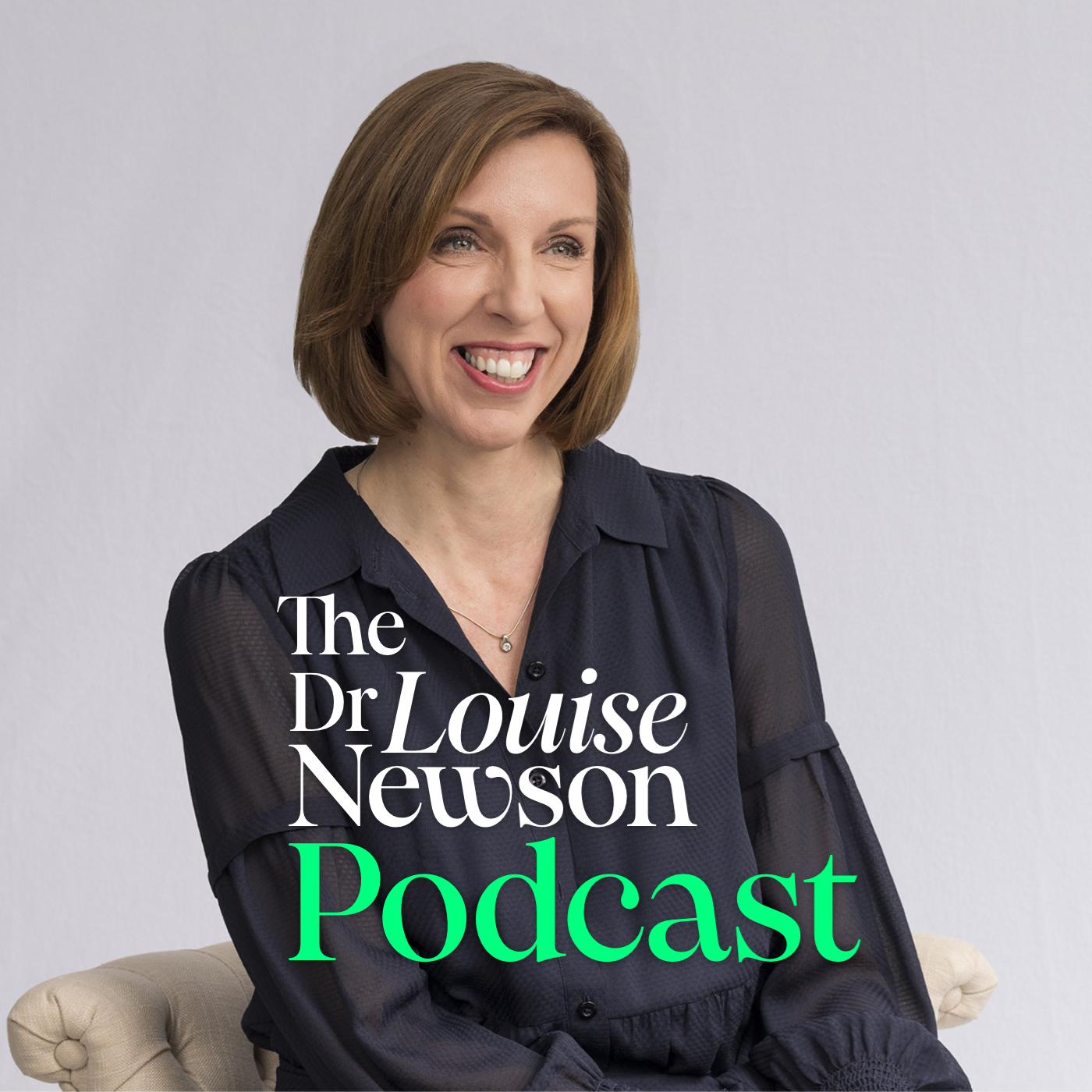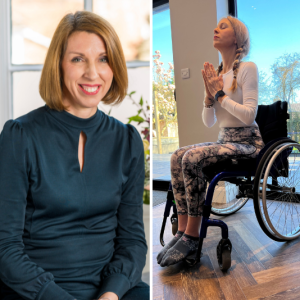
8.5M
Downloads
311
Episodes
Dr Louise Newson is an award-winning physician, respected women’s hormone specialist, educator, and author committed to increasing awareness and knowledge of perimenopause, menopause, and lifelong hormone health. Each week, Louise dives into the newest research, treatments and hot topic issues, providing accessible, evidence-based information to empower your future health. Joined by fellow experts and special guests, with answers to your burning questions, Louise explores how hormones impact every aspect of our lives. Described as the “medic who kickstarted the menopause revolution”, Louise aims to empower a generation of women to have a greater understanding, choice and control over their treatment, bodies, minds and future health through their hormones. She is the creator of the award-winning free balance app, a Sunday Times bestselling author and the founder of the Newson Health clinic. With over three decades of clinical experience, Louise is a member of the Royal College of Physicians, a Fellow of the Royal College of GPs, a Visiting Fellow at Cambridge, a regular contributor to academic journals including the Lancet and the British Journal of General Practice, and has been awarded an honorary Doctorate of Health from Bradford University. DISCLAIMER: The information provided in this podcast is for informational purposes only and is not intended as a substitute for professional medical advice, diagnosis, or treatment. Always seek the advice of your physician or other qualified health providers with any questions you may have regarding a medical condition. The views expressed by guests are their own and do not necessarily reflect the views of Dr Louise Newson or the Newson Health Group.
Episodes

Tuesday Jul 11, 2023
212 - How to thrive at work during the menopause
Tuesday Jul 11, 2023
Tuesday Jul 11, 2023
This episode looks at how hormone changes impact women in the workplace and in their personal lives – and why do many women put their own needs last?
Dr Louise is joined by Dr Claire Kaye, an executive career coach and former GP specialising in perimenopause and menopause in the workplace. Dr Claire explains how career coaching can help bring about clarity and focus, particularly when you’re dealing with physical and psychological symptoms during the perimenopause and menopause.
And both Dr Claire and Dr Louise offer advice on how to navigate these changes and overcome negative emotions to prioritise your own health and wellbeing.
Dr Claire’s top three tips for building self-esteem:
- Recognise what it is that you’re feeling, take a few minutes to work out what it is that’s an issue for you at the time and label it
- Ask yourself ‘what might help here?’ or ‘who might help here?’
- Pick one really simple thing that will help and feels really comfortable: and do it.
You can follow Dr Claire on Instagram @drclairekayecoaching, LinkedIn @drclairekaye or visit her website here.

Tuesday Jul 04, 2023
211 - Melasma: keeping hyperpigmentation at bay in the summer
Tuesday Jul 04, 2023
Tuesday Jul 04, 2023
Consultant dermatologist Dr Sajjad Rajpar returns to the podcast this week for a special summer episode about melasma, a condition that leads to darkening or brown patches developing on the skin.
Up to 85% of those affected by melasma are women – and there is a connection between this condition and female hormones.
Dr Sajjad and Dr Louise delve into what is known about this chronic complex condition, why it is crucial to protect your skin from the sun and the wide range of treatment options available, including topical treatments and laser therapy.
Dr Sajjad’s three top tips on what to do if you suspect you have melasma, plus advice on self-management:
- Educate yourself on how to tell the difference between melasma and freckles – look at the areas of the face where it occurs. Family history and background may mean you are more susceptible.
- Sun protection is crucial in managing melasma. This means being really disciplined with using sunscreen, and seeking out a tinted version that will block visible as well as ultraviolet light.
- There are a wide range of active skin ingredients that can help with melasma; Dr Sajjad suggests starting with azelaic acid or arbutin to treat your condition.
For more information about Dr Sajjad, visit www.midlandskin.co.uk

Tuesday Jun 27, 2023
Tuesday Jun 27, 2023
How do you work out what the right dose of HRT is for you and balance the benefits with any potential risks?
In this episode, Dr Louise talks about HRT doses with Corinna Bordoli, who began experiencing menopausal symptoms when she was just 10 years old.
Corinna shares her experience of premature ovarian insufficiency (POI) – menopause before the age of 40 – and of the challenges she faced in getting a prescription for a higher dose of estrogen to help both her symptoms and future health.
Dr Louise and Corinna discuss why hormone needs and absorption can vary from woman to woman, particularly for those with POI.
Corinna’s three tips for those who may suspect they have POI:
1. Keep track of your perimenopausal and menopausal symptoms so that you have evidence when you go to see your doctor.
2. If you are diagnosed with POI make sure you seek out a specialist in the condition to get the best care.
3. If you have POI, find a community of other people with similar experiences for support, such as through the Daisy Network. Sharing your story and hearing other people’s stories can make a huge difference and be healing.
Find out more about the charity the Daisy Network mentioned in the podcast here, or on Twitter @thedaisynet.

Tuesday Jun 20, 2023
209 - Learning disabilities and the menopause
Tuesday Jun 20, 2023
Tuesday Jun 20, 2023
On this week’s episode of the Dr Louise Newson podcast, Dr Louise welcomes Sharon Saunders.
Sharon is a menopausal woman with learning disabilities and is a wheelchair user.
During the episode, Sharon talks about when she first learned about the menopause from her mum, and her menopause symptoms, including joint aches and pains and headaches. She describes how these symptoms make her feel and the impact on her daily life, and Dr Louise and Sharon also talk about treatment options.
Finally, Sharon offers some important advice to other women with learning disabilities who are going through the perimenopause and menopause: speak up about how you are feeling, and don’t give up.
Sharon is supported by Dimensions, a not-for-profit organisations supporting people with learning disabilities, autism, behaviours of distress and those with complex health needs.
Click here for more information more about Dimension or on Twitter @DimensionsUK.
And click here for an easy read booklet on the perimenopause and menopause by balance and Dimensions.

Tuesday Jun 13, 2023
208 - Ultra-processed food unwrapped with Henry Dimbleby
Tuesday Jun 13, 2023
Tuesday Jun 13, 2023
Henry Dimbleby, co-founder of Leon, food campaigner and writer, joins the podcast this week to talk about the dangers of a diet high in ultra-processed foods – that is, foods with a long list of ingredients such as preservatives and emulsifiers not typically found in home cooking.
While convenient, ultra-processed foods such as breakfast cereals and mass-produced breads do not fill us up, encourage us to eat more and contribute to weight gain, Henry says.
‘Food is by far the biggest thing making us sick,’ he says.
In this episode, Henry talks to Dr Louise about breaking the ultra-processed food cycle, ignoring calories and eating more food cooked from scratch. They also discuss his new book Ravenous, which looks at how to eat in a way that is better for you and the planet.
Henry’s three tips:
- Exercise has huge benefits for your health, so find an enjoyable form. Don’t think about it as being for weight loss, but for other health benefits.
- Cook from scratch as much as you can and include lots of fibrous green veg and pulses in your dishes.
- Try and reduce ultra-processed, plastic-wrapped food packed with mystery ingredients in your diet. Getting rid of breakfast cereals is a good place to start.
Find out more about Henry’s work here and follow him on Twitter @HenryDimbleby

Tuesday Jun 06, 2023
207 - Managing menopause while living with physical disabilities
Tuesday Jun 06, 2023
Tuesday Jun 06, 2023
Laura Bibby joins Dr Louise to share her experience of managing the perimenopause shortly after a life-changing spinal cord injury.
A senior nurse and an ambulatory wheelchair user, Laura shares her struggles to have urinary symptoms, crippling anxiety and joint pain recognised as being due to her perimenopause, and not just attributed to her injury.
In an empowering conversation, Laura and Dr Louise discuss the importance of persistence, and speaking out to help women with disabilities overcome barriers preventing them getting the menopause care and treatment they deserve.
Laura’s three tips:
- Be persistent – If something doesn’t feel right with your health, keep pushing and seeking for the right treatment. Even if a healthcare professional dismisses your request, keep going and explore other options
- Speak up and don’t feel ashamed. Menopause affects everyone
- Normalise conversations around women’s health, don’t have them in secret. Discuss periods and the menopause openly so that it is easier to go and ask for help when needed
Follow Laura on Instagram @blue__brick_disability and you can read more about her story in this article on the balance website.

Tuesday May 30, 2023
206 - Utrogestan supply issues: what it means and alternatives available
Tuesday May 30, 2023
Tuesday May 30, 2023
The supply of HRT medication Utrogestan is being restricted by the UK government because of shortages amid increase demand.
Pharmacies will only dispense two months’ worth of Utrogestan 100mg capsules per prescription to help ensure continued access for women.
In this special episode, Newson Health pharmacist prescriber and menopause specialist Faiza Kennedy joins Dr Louise to talk about the restrictions, and where and how to seek advice and help.
They talk about the importance of taking a progesterone as part of your HRT regime if you still have a womb, as well as alternatives to Utrogestan, including progesterone in pessary form, the Mirena coil and combined forms of HRT containing both estrogen and progesterone.
Faiza’s top three tips:
- Only order the amount of Utrogestan you need to help everyone get through the shortfall
- Be organised about ordering your HRT prescriptions. Do it about two weeks before you run out so you have time in case you have any difficulties getting your supply or need to seek an alternative
- Reach out for help if you are struggling with your supply
Click here for a balance article for more information about the current Utrogestan supply restrictions, plus alternatives.
You can read more about Faiza here.

Tuesday May 23, 2023
205 - Author Joanne Harris: ending the invisibility of menopausal women
Tuesday May 23, 2023
Tuesday May 23, 2023
Bestselling author of Chocolat Joanne Harris joins Dr Louise Newson to talk about her latest book, Broken Light.
Broken Light’s protagonist is Bernie, a 49-year-old who has given her life to her family and friends, and feels invisible. But Bernie finds her supernatural powers as she reaches the menopause, which becomes a metaphor for the anger of women in later life who are too often silenced in art and reality.
In this episode, Joanne talks about her own menopause experience, and her and Dr Louise discuss their work in ensuring the voices of women are heard as they get older – and the progress that still needs to be made.
Joanne’s four reasons to read her new novel:
- Menopause is a universal experience that needs to be understood. The way women feel shapes our world and shouldn’t be ignored
- Because if you are a woman you will experience the menopause
- If you are man, menopause will also be part of your experience at some point, and you need to be informed
- Because it is a fun read!
Click here to find out more about Joanne Harris, and follow her on Twitter at @Joannechocolat

Tuesday May 16, 2023
204 - Hormonal changes and mental health: maternal mental health awareness
Tuesday May 16, 2023
Tuesday May 16, 2023
Advisory: this podcast contains themes of mental health and suicide.
Earlier this month Maternal Mental Health Awareness Week was marked across the UK. In this week’s episode Emma Hammond, an employment lawyer specialising in advising women who have experienced discrimination due to the menopause, generously shares her own story.
After a traumatic birth with her first child, Emma developed serious symptoms, including psychosis and not sleeping or eating, that ultimately led to medication and hospitalisation. While she wanted a second child, her periods stopped and she was told she was perimenopausal – but an unexpected development took place soon after she was admitted to a mental health hospital.
Here she and Dr Louise talk about the powerful role of hormones in women during pregnancy, birth and perimenopause, and how hormones can be overlooked by healthcare professionals caring for women struggling with their mental health.
This podcast follows an earlier episode with Emma where she talked about her career, and offered advice on menopause in the workplace.
Emma’s three tips:
- See your GP promptly if you are struggling with your mental health and don’t think you can fix everything yourself
- Be honest and open with your family and friends about what you are going through so that they can support you
- Think about life changes and holistic approaches as well as hormonal treatments or medication.
Read more about Emma here.
Contact the Samaritans for 24-hour, confidential support by calling 116 123.

Tuesday May 09, 2023
203 - Nursing and the menopause: International Nurses Day special episode
Tuesday May 09, 2023
Tuesday May 09, 2023
In a special episode on the eve of International Nurses Day, this week’s guest is Sue Thomas, an advanced nurse practitioner with an interest in menopause who works alongside Dr Louise at Newson Health Menopause and Wellbeing Centre.
They discuss Sue’s 30-year nursing career, including her work in cardiovascular disease prevention, and talk about the vital role nurses play in raising awareness and treating women during the perimenopause and menopause.
And with figures showing nine out of ten UK nurses are women, and more than half aged over 41, Sue and Dr Louise discuss the impact of the perimenopause and menopause on the nursing profession, with Sue sharing her own menopause experience and the barriers she faced when trying to access HRT.
Sue’s three take home tips for fellow nurses and healthcare professionals are:
- Look for more education about the menopause, such as the free Confidence in the Menopause course
- If you are struggling with menopause yourself, be open with colleagues and line managers – we need to look after each other
- Let’s make the menopause a positive thing.
Click here to read an advice article by Sue for healthcare professionals on coping with menopause in the workplace.
